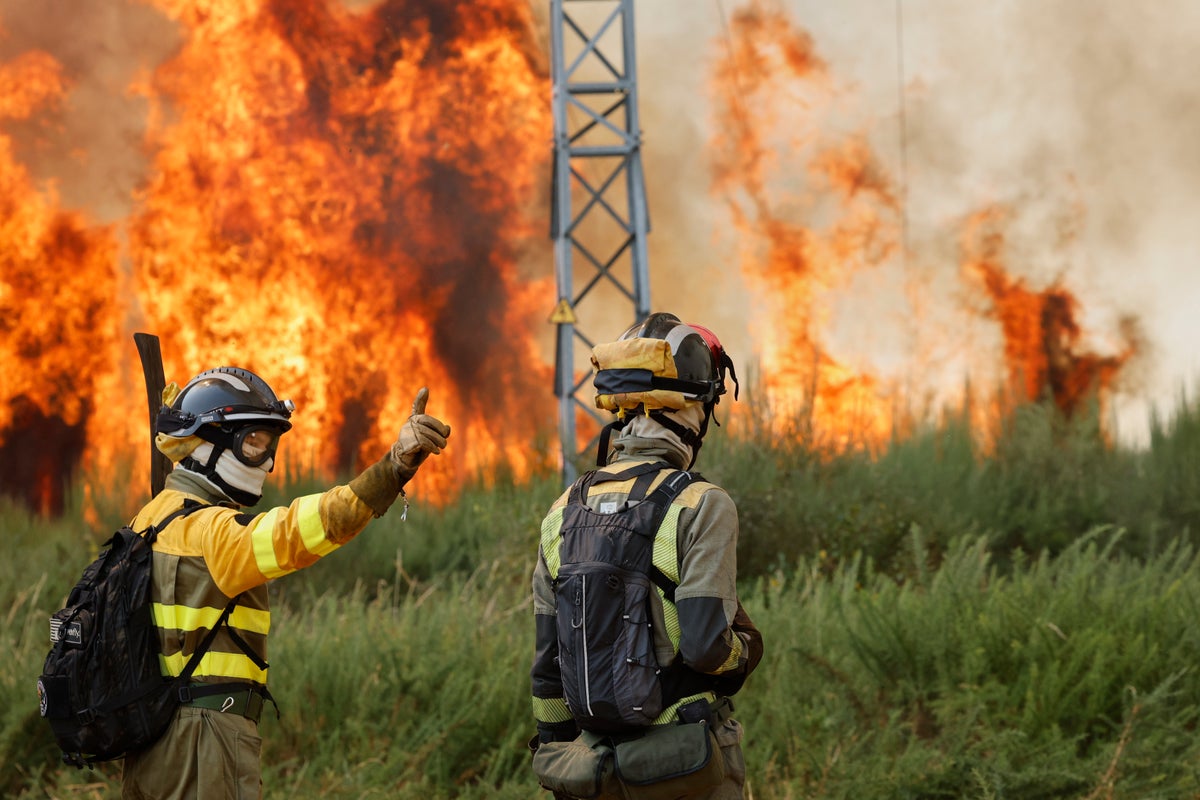
Four people have been killed in Spain as the country is hit by its worst wildfires on record.
Authorities have deployed nearly 2,000 troops to help firefighters tackle blazes that have devastated swathes of the country, as temperatures hit highs of 45C.
A severe 16-day-long heatwave has fuelled around 20 wildfires, burning more than 115,000 hectares in the regions of Galicia and Castile and Leon over the past week. Flames have spread to the southern slopes of the Picos de Europa mountain range and the famous Camino de Santiago pilgrimage route.
A firefighter died when his truck crashed near the village of Espinoso de Compludo, raising the death toll to four from the recent wave of fires.
In neighbouring Portugal, wildfires have burned about 216,200 hectares so far this year, according to the European Forest Fire Information System (EFFIS) – more than four times the 2006-2024 average for this period – and two people have died.
Southern Europe is experiencing one of its worst wildfire seasons in two decades, with Spain and Portugal among the hardest-hit countries.
So far this year, an estimated 344,400 hectares (851,000 acres) have burned in Spain – an area equivalent to the size of the island of Mallorca – according to the EFFIS. It’s the largest area on records that go back to 2006 and more than four times the 2006-2024 average.
Spanish prime minister Pedro Sánchez cut his holiday to the Canary Islands short to visit areas devastated by the wildfires, proposing a “grand state pact” to prepare the country for climate-related events such as wildfires and hurricanes.
“We need to do a thorough analysis of how we can resize our prevention and response capabilities to the climate emergency,” he said. “We must leave this issue outside of partisan strife. We are all part of the same state, and we must all work in the same direction.”
Defence minister Margarita Robles told radio station Cadena SER that the country hadn’t experienced such a fire situation this severe in 20 years: “The fires have special characteristics as a result of climate change and this huge heatwave.”
She said thick smoke was affecting the work of helicopters and aircraft carrying water to extinguish the flames.
Spain’s Ministry of the Interior says 27 people have been arrested and 92 are under investigation for suspected arson since June.
Wildfires in southern Europe have grown so devastating that 155,000 hectares of land have been burnt in Portugal, according to the ICNF forestry protection institute. This is three times the average for this period between 2006 to 2024. About half of that area burned in the past three days.
While Portugal is set for cooler weather in the coming days after several woodland fires, the country’s resources have been stretched after more than 4,000 firefighters and 1,300 vehicles were deployed on Sunday, as well as 17 aircraft, according to the Civil Protection Agency.
Europe has been warming twice as fast as the global average since the 1980s, according to the EU’s Copernicus Climate Change Service. Scientists say that climate change is exacerbating the frequency and intensity of heat and dryness in parts of Europe, making the region more vulnerable to wildfires.
Greece, Bulgaria, Montenegro and Albania have also requested help from the EU’s firefighting force in recent days to deal with forest fires.
Recent wildfires in Turkey have killed 19 people, and on Sunday, six villages in the Canakkale province were evacuated as precautionary measures.
Some 1,300 firefighting personnel backed by 30 aircraft were battling the blaze, according to the General Directorate of Forestry. A wildfire on the peninsula to the north of the Dardanelles Strait led to the closure of visitor facilities at Gallipoli, the site’s management said.
The area is dotted with cemeteries, memorials and other remnants of battles waged between Ottoman and Allied troops in 1915. Turkey has been struck by hundreds of fires since late June, fueled by record-breaking temperatures, dry conditions and strong winds.
